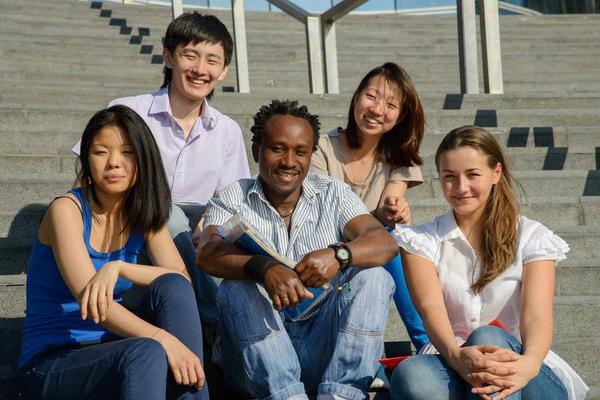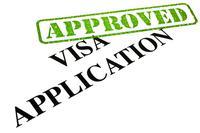
If granted, the F1 visa allows the foreigner to come to Nevada to complete a course of study, but he/she is limited in pursuing employment prospects.
Click below on a frequently-asked-question about F-1 student visas in Nevada to go directly to that topic:
- 1. What Nevada schools accept F-1 visa holders?
- 2. Am I eligible for an F-1 student visa in Nevada?
- 3. How do I get an F-1 student visa in Nevada?
- 4. Can I work while on an F-1 student visa in Nevada?
- 5. Can I transfer schools on an F-1 Visa?
- 6. Can I study on a visitor (B-1/B-2) visa?
- 7. How soon do I have to leave Nevada on an F-1 visa after school finishes?
- 8. What if I am arrested while on an F-1 visa?
Also see our article on J-1 exchange program visas in Nevada.

1. What Nevada schools accept F-1 visa holders?
The majority of Nevada’s scholastic institutions fall within the SEVIS (Student and Exchange Visitor Program) category: colleges, universities, high schools, private elementary schools, seminary, conservatories, and other academic institutions, such as language training programs.
(For information on student visas for non-academic, vocational programs, go to our article on M-1 vocational student visas to study in Nevada.)
1.1 Las Vegas F-1 schools for international students
The following are some of the Las Vegas schools that welcome F-1 visa students:
- UNLV
- College of Southern Nevada
- FLS International
- DeVry
- Touro
- Mohave Community College

The University of Nevada, Las Vegas, has a considerable international population for a state university. Its undergraduate population is 4% foreign, which amounts to nearly 1,000 undergraduate F-1 visa students. UNLV’s graduate schools have an even higher international population percentage-wise. Some of the most common majors among UNLV F-1 visa holders are hospitality, computer science, entertainment engineering and design.
Foreigners interested in applying to UNLV through the F-1 visa program should start by visiting the UNLV International Students and Scholars site. It has information on all the UNLV form and resources foreign students need to get started.
1.2 Reno F-1 schools for international students
The following are some of the Reno schools that welcome F-1 visa students:
- UNR
- Truckee Meadows Community College
- Western Nevada College
- Sierra Nevada College

The University of Nevada, Reno, has students from more than 70 different countries around the world, amounting to nearly 350 undergraduates and several dozen graduate F-1 visa students. Foreigners interested in studying at UNR on an F-1 visa should start by visiting the UNR Office of International Students and Scholars site. Common majors for UNR F-1 visa holders are biology, business and engineering.
For a full list of Nevada SEVIS schools, click here.
2. Am I eligible for an F-1 student visa?
There are five main qualifications foreigners need in order to be eligible for an F-1 student visa:
- Residency in a foreign nation: Home has to be in a country other than the United States
- Acceptance to an approved school: Foreigners may not apply for F-1 visas unless they already have been accepted to a U.S. school approved by ICE‘s Student and Exchange Visitor Program (SEVP). (Many of these Nevada schools are listed above.)
- Enough money to live on: Applicants must demonstrate they will have enough money to cover their tuition and living expenses since there is no guarantee they will be allowed to work.
- Ties to the applicant’s home country: Evidence of the applicant’s family members, bank accounts, job offers, and/or other assets can help demonstrate ties to the home country.
- Intention to go home following school: If the visa interviewer suspects that the applicant is planning to move to the United States permanently, the visa will likely not be granted.
3. How do I get an F-1 student visa in Nevada?

The first step for getting an F-1 student visa in Nevada is to apply and be accepted to the Nevada school the student wants to attend. Applicants should probably begin the application process a good six months to a year prior to the time they wish to begin their course of study.
The second step is to pay the U.S. government a Student and Exchange Visitor Information System fee, which is currently $350 for F1 students. At this point, the school will provide the applicant with an I-20 form, which is a certificate of eligibility to apply for a student visa. The applicant’s spouse and children will also need I-20 forms if they intend to live with the applicant in Nevada.
The third step is to apply for an F1 visa using a DS-160 form. There is also a visa application fee, which is currently $160 dollars for F1 students.
Finally, the applicant will schedule and attend a visa interview to live in Nevada, which may be at his/her local US consulate or embassy. Applicants will need to produce a valid passport, the visa application, the receipt for the visa application fee, a passport photo, the I-20 form, and there may be some other required paperwork as well, including past degrees and standardized test scores. Note that applicants under 14 and over 79 are usually not required to have an interview.
4. Can I work while on an F-1 student visa?
Probably, as long as the F-1 student has the approval of both the school’s International Office as well as the Department of Homeland Security…
With regard to on-campus employment, students on F-1 visas are usually permitted to work full-time in between semesters and up to 20 hours a week while school is in session.
With regard to off-campus employment, F-1 students may not work during the first academic year. Afterward, F-1 students may be able to work for up to 1 year through the Optional Practical Training (OPT) program. OPT is a way for F-1 students to train in a field directly related to their major. Typically, F-1 students can do OPT part-time during the semester and/or full-time during vacation or following graduation.
F-1 Students may also be able to work off-campus through Curricular Practical Training (CPT) programs and STEM (Science, Technology, Engineering, and Mathematics) Optional Practical Training Extension (OPT).
Note that when the student’s F-1 visa is nearing expiration, it may be possible to qualify for employment-based visas in order to stay and work in the U.S.
5. Can I transfer schools on an F-1 Visa?

Though F-1 students are expected to study at the school the visa originated through, it may be possible to transfer to a different academic institution between semesters. The F-1 student should reach out to the prospective school’s International Office for guidelines. Attempting to transfer schools without approval and the correct documentation could jeopardize the student’s academic future in the U.S.
6. Can I study on a visitor (B-1/B-2) visa?
Only if the academic program is short and recreational and does not go towards a degree. Learn more in our article about Nevada B-1/B-2 visas.
7. How soon do I have to leave on an F-1 visa after school finishes?
The purpose of F-1 visas is for foreign students to bring the education they gained in the U.S. back to their home country. F-1 visas are not pathways to U.S. citizenship in Nevada. However, F-1 visa students are allowed to stay in the United States for 60 days following the completion of their academic program or Optional Practical Training. F-1 students who hope to remain in the U.S. any longer have to either apply to change their visa status or continue their education with new visa documentation.
8. What if I am arrested while on an F-1 visa in Nevada?
Depending on the case, F-1 visa holders charged with a criminal offense may be incarcerated at Las Vegas Immigration Jail and subject to deportation, let alone disqualified from studying in the U.S. ever again. It is important that the student seek legal counsel to try to fight the charges and avoid any academic consequences. Learn more about the criminal defense of non-citizens in Nevada.

